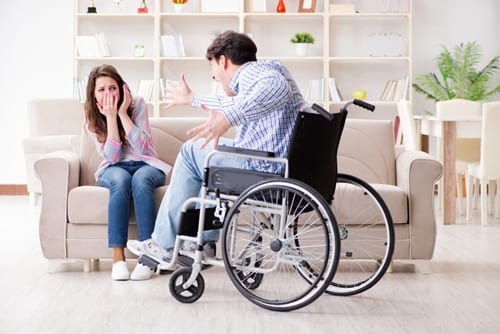Approaching Someone Who Is Angry
When a person with dementia or a mental illness is angry, they may not think clearly. Therefore, it is very important to use caution when approaching if they show signs of aggression. In addition, their actions may be unpredictable. Even close relatives may not recognize you and may believe that you are a stranger who wants to cause them harm. If so, they will defend themselves, and one of you may get hurt. Therefore, be aware of your surroundings and have an escape plan in mind if your conversation does not go well and you need to leave quickly. Safety first always.
Set the Stage to Talk
If you plan to meet with someone known to be explosively angry or aggressive, set the stage before the meeting to be as safe as possible. In one of my former positions, I participated in lots of interventions where situations could become hostile. As part of my training for the role, I attended seminars with law enforcement, FBI, crisis management and domestic violence intervention experts, emergency management planners, and other professionals familiar with intervention strategies. One important principle they all stressed was to assess situations first for safety – prepare for the worst and hope for the best. De-escalation techniques always came first. Below are some of the ones I routinely put into practice.
- Cleared area of objects available for use as potential weapons. (i.e., heavy objects, breakable glass or ceramic, aerosols, sharp, pointed objects, etc.).
- Arranged to have someone nearby to listen for a signal or call for help if things got out of hand. I gave them instructions on what I wanted them to do for various situations and how to get help; plus, we tested the plan.
- When entering the room, I let my guest enter first. With the potentially angry person located further in the room than me, I could leave first without passing by them if I needed to escape.
- Keep the exit path open. Position a desk or coffee table between you and the angry person to slow their progress if you need to leave.
- Sit across from your guest, not next to them, or at opposite ends of the table. The greater the distance, the more time you have to escape.
- Leave immediately if the situation becomes volatile. Shut the door behind you to slow down your angry family member’s progress if they start to follow you. Call 9-1-1 for help.
Monitor Your Voice Tone
Often, it’s not what you say but how you say it that sets someone off. When you approach your family member, speak to them slowly, in a calm, respectful tone of voice – even though they might be yelling and screaming at you. It’s important not to raise your voice to match theirs.
People tend to mimic the voice levels of the person with whom they are speaking. By lowing yours, you may be able to get them to follow your lead. Here are some other ways you can
Ways to Deal with Verbal Aggression
- Agree with them. – Rather than argue an opposing point, agree with them. You cannot persuade a dementia patient to change their mind. The best way to calm them down is to acknowledge their feelings and see things from their perspective.
- Apologize. – Try apologizing, even if it’s not your mistake, to defuse the situation.
- Time Out. – Leave your family member alone to give them time to cool off.
- Pretend not to know why they are angry. – Ask your family member to help you understand the reason. Tell your family member who you are and why you are there. Try to say something to make them smile to see if you can distract them.
- Ask Them to Talk to You About Their Concerns. – Politely explain that you want to find out what is bothering them, and you hope they will talk to you about it. Keep your body language open and relaxed. Let your body language “message” to your family member be that you care about what’s bothering them and have plenty of time to listen.
- Make Good Eye Contact. – As you speak, face them, making good eye contact. If they stand, you stand. If they sit, you sit. Speak on their level so they don’t feel threatened. Always stand where they can see you; otherwise, they become suspicious about what you are doing.
- Respond positively – Try to maintain a positive, caring facial expression during difficult conversations.
- Touch Their Hand or Gently Rub Their Back. – However, a word of caution! Some people do not like to be touched. Know whether your family member is likely to respond positively or become more upset if you touch them before you do so. Touch is a very intimate action, and I advise you to carefully consider how you use it. For example, if you are talking to someone who draws back as you draw near or moves their hand if your hand or body is near, do NOT touch them. It will only agitate them more.
- Let them pace alone. – If your family member starts pacing back and forth and suddenly decides they must leave the room, do not try to stop them. Let them go. You can follow behind them to confirm they are safe but let them leave. You might even want to take along a folding chair so that you will have a place to sit if he wanders far.
- Please don’t Attempt to Win an Argument or Change Their Mind About Anything. – When someone with dementia becomes very angry, understand that you cannot convince them to change their mind about what they believe or what they think they might see. If your family member has dementia and is angry, don’t attempt to convince them of anything or re-orient them to “reality”; instead, try to divert their attention.
What If the Agitation Continues?
Suppose your family member’s behavior continues to be agitated? In that case, it may not be easy to remain calm. Check yourself periodically to see if you are beginning to crowd them, argue, criticize, raise your voice, or fall into the trap of following their aggressive behavior. If so, if it’s safe, you may need to step away for a time to take a breather before you continue to deal with the situation. If your behavior is tense, their behavior will follow suit. Either walk away or, if you can tag-team someone else to take over, try to remove yourself from the situation if neither is an option, attempt to divert their attention to something else.
Physical Abuse
Unfortunately, behaviors sometimes get out of hand. Family members with dementia may not be able to control their emotions. They may strike out at someone they feel is attempting to harm them. Do not ignore physical abuse. A diagnosis of dementia does not provide them with the right to “act out” or harm anyone else. If your family member is violent and physically aggressive, notify their doctor promptly about the behavior to begin a correction plan.
Call 9-1-1
Safety is your priority if your family member cannot calm down, and violence may concern you. Always call 9-1-1 in emergencies. Tell the dispatcher that you need help dealing with your family member who has dementia and has become aggressive. Contact your local police department in advance to advise them of your potential need for assistance if they receive an emergency call to your residence. Doing so saves you time and provides them with the necessary information for the future should you need help but be unresponsive.
Resources:
https://alz.org/help-support/caregiving/stages-behaviors/anxiety-agitation
https://alz.org/help-support/caregiving/stages-behaviors/aggression-anger
https://www.verywellhealth.com/anger-and-aggression-in-dementia-4134488
https://www.seniorguidance.org/senior-living/how-to-deal-with-dementia-behavior-problems/
https://www.homecareassistanceedmonton.ca/how-can-i-manage-an-aggressive-parent-who-has-dementia/

